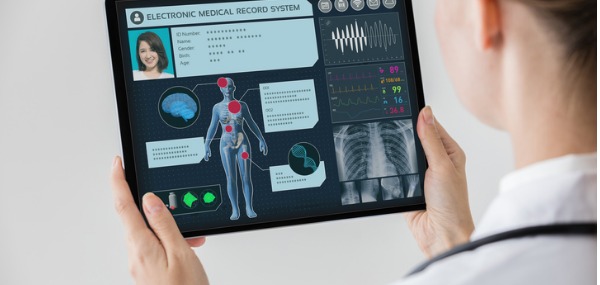What is an Informatics Nurse Specialist?
The paper records systems that have been used by healthcare providers for more than a century are quickly coming to an end. An informatics nurse specialist is at the forefront of changing technology in the medical world.
Nursing informatics is a well-established specialty within nursing. The American Nurses Association defines the position as "overseeing the integration of data, information and knowledge to support decision-making by patients and their healthcare providers."
What does an Informatics Nurse Specialist do?
Technology is now at the point-of-care in hospitals and nursing homes — from electronic medical records and barcoded medication administration, to physiologic monitoring and 'smart' IV pumps and beds.
Informatics nurse specialists often act as the liaison between health care and technology in order to allow better decisions to be made based on more accurate data.

Many informatics nurse specialists are registered nurses, which is key in understanding the workflow as well as the working environment of the various care settings.
This role is an essential part of healthcare and a major factor in selecting, implementing, and evaluating health IT that promotes safe, high quality, patient-centric care. For nurses with an interest in technology and for improving patient care, becoming an informatics nurse specialist may be a good career fit.
Informatics nurse specialists are able to choose an appropriate system; provide systems preparation, development, optimization and maintenance; write policies; train and provide support to systems users; perform quality control; and even sales. They are also involved in educating other nurses and promoting professional development.
The American Nurses Association in the Scope and Standards of Practice has listed the major functional areas for informatics nurse specialists, which include:
- Administration, leadership and management - with clinical informatics departments or in other areas such as serving as project managers
- Analysis - using data to synthesize knowledge, inform decision support, and manage outcomes as well as taxonomies
- Compliance and integrity management - making sure organizations are meeting all the national laws and standards such as HIPAA, FDA, Joint Commission, etc.
- Consultation - serving both internally or externally as a resource
- Coordination, facilitation, and integration - serving as the translator between end-users and IT experts
- Development - translating user requirements into solutions
- Education and professional development - can range from teaching the end-user to use a device or application, to educating the next generation of nurses and the general public
- Policy development and advocacy - being an advocate for consumers, hospital units, and the institution as a whole; also helping shape policies and standards at the state, national and organizational level
- Research and evaluation - conducting research in a variety of informatics topics that impacts both caregivers and consumers
What is the workplace of an Informatics Nurse Specialist like?
Informatics nurse specialists are needed in areas of public health, primary care, pharmacology, and intensive care. They work for hospitals or healthcare systems, in academic settings, for vendors, or in consulting.
As this career grows, so do the number of opportunities for those interested in this field of nursing.
Informatics Nurse Specialists are also known as:
Nurse Informatics Specialist
INS
Nursing Informatics Specialist
Clinical Informatics Analyst
Nurse Systems Specialist